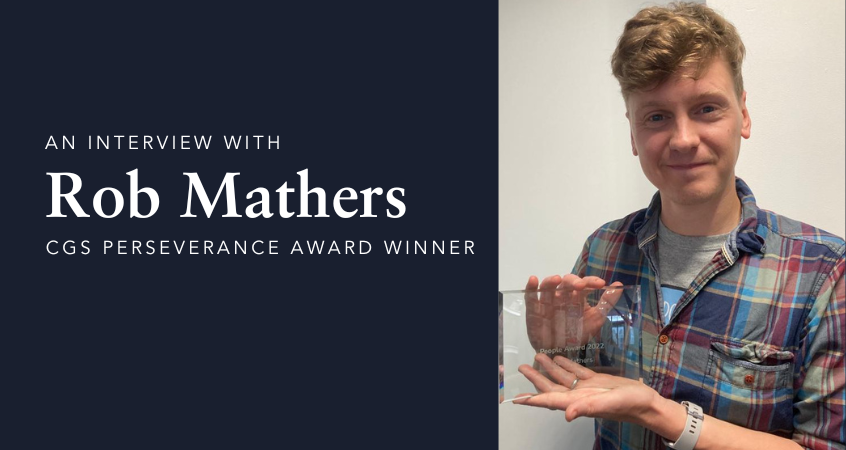Last month, we met staff member Andrea Barnard, a joint winner of the first-ever CATS Global Schools (CGS) People Award.
Today, we recognise Rob Mathers, Head of the Mathematics Department at CATS Cambridge and Chief Examiner for STEM of the University Foundation Programme. He describes his role as “varied, challenging and enjoyable” and is a great believer that you should “always back yourself.”
Rob was the inaugural joint winner of the CGS Perseverance Award. This award celebrates employees who have exhibited true perseverance, dedication, and persistence to improve the staff or student experience.
Rob was described as “going above and beyond” to provide continuity for CATS Cambridge Maths students, offering extra coaching outside class. This took place during a challenging time for the team due to the bereavement of a department staff member.
One colleague described Rob as “cheerful, helpful and a has had a stabilising, consoling and motivating influence on the members of the maths department.” Rob started his career at CATS Cambridge in 2009 as a Newly Qualified Teacher, quickly progressing after demonstrating strong leadership qualities.
What you led you to a career in teaching?
I completed a Masters’ Degree in Mathematics and wanted to use what I had learnt in my profession. I had two options – one was to continue in academia, and the other was to teach. I made the right choice as I fell in love with teaching my subject and working with international students. I didn’t have a particularly international childhood growing up in Bury St Edmunds!
What was your journey to your current role?
After my Maths degree at Durham, I completed my teacher training at Exeter, so this is still my first job! Since then, I have held many responsibilities within the college, from being an Assistant Programme Director to running the college Rock Band Club. I am currently studying for a Postgraduate Advanced Certificate in Educational Studies: Educational Assessment with Cambridge University to become more skilled in my role as Chief Examiner for the University Foundation Programme.
What changes have you pioneered in your current role?
As Head of Mathematics, I am currently instigating a departmental initiative to develop subject-specific metacognition strategies in our students. Research shows that this will develop problem-solving skills in our mathematicians, which is a big requirement of the Maths A level.
As UFP Chief Examiner, I have overseen and supported the development of bespoke Maths and Computing curricula for our international students. The focus has been on making the programme more relevant and developing new content at a higher level. Students are interested in skills that will help them in their careers, so for Computing, for example, we have recently redeveloped the robotics and coding parts of the course.
What does perseverance mean to you?
Keeping going at something that is not easy. Sometimes taking one step forward and two back, but not giving up. Shrugging off setbacks and being determined to reach your goal. I always try to model perseverance for my daughters and try to teach them to have a growth mindset.
How do you show perseverance when you’re having a bad day?
If something has gone wrong and I have the choice between laughing or crying about it, I always try and go for the former.
What tips have you got for developing perseverance?
If I have a particularly large or arduous task I have been putting off, I tell myself to work on it for five minutes. Often big jobs do not seem as bad once you have started them.
Who do you most admire that shows true grit and determination?
The dedication and drive shown by elite-level athletes have always impressed me as someone who enjoys sport. The dedication required to reach the top level of any sport is inspiring to read about.
What tip would you give to a trainee teacher starting in the profession?
Don’t beat yourself up if you make mistakes in a lesson, but make sure you think about why it went wrong. Reflecting on your practice and getting feedback and advice from other teachers is a good habit. Your pedagogy is always something you can improve, and teachers should always aim to be getting better throughout their whole careers.
